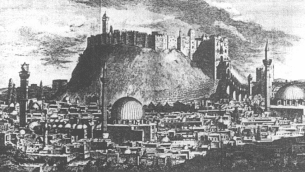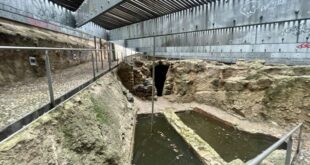 Sephardic Passover nights used to begin with stories that our grandparents enjoyed sharing with their children, grandchildren, relatives and friends. Sadly this custom has fallen into disuse often favoring discussions of Hollywood movies, popular culture, social justice issues or insufferably long Talmudic speeches. I am not against those topics for discussion but in an ideal world, the Sephardic tales would still be present as Grand Opening for the Passover nights or during the supper.
Sephardic Passover nights used to begin with stories that our grandparents enjoyed sharing with their children, grandchildren, relatives and friends. Sadly this custom has fallen into disuse often favoring discussions of Hollywood movies, popular culture, social justice issues or insufferably long Talmudic speeches. I am not against those topics for discussion but in an ideal world, the Sephardic tales would still be present as Grand Opening for the Passover nights or during the supper.
Since Pesah just ended, I would like to share a story that my grandfather recounted every single feast of Passover. The story goes like this:
A long time ago, there was a Hakham (as we call our rabbis in the Sephardic world) in Aleppo, Syria, who was known to be a shy and quiet man -an introvert by today’s standards-. His name was Raphael Sasporta.
Aleppo, also known under its ancient Aramean name, Aram Soba, is one of the most ancient cities in the world, only competing with its sister city, Damascus. Their inhabitants were very proud of its beauties, food, their millenary culture, manners and sages. That particular year was not one of the best for the Jewish community of Aleppo and in general for Syria. There was not much rain, crops were lost, and new immigrants from Turkey, Italy, France, Iraq, England, Iran and Greece arrived, seemingly, every day to engross the Jewish community, which at that time, was somehow divided in two different groups.
The first group, were the ancient indigenous Jews called Mustarabim that had lived in Syria since immemorial times as far back as King David, aligned with the Sephardic exiles that emigrated to Aleppo and Damascus after the expulsion from Spain in 1492.
The second group was comprised of recent immigrants from Italy, England and France, called Signori Franchi or just Franjis, who were mostly, wealthy Sepharadim, “Grandes Seniores”, as they were called in Spanish; all of them polyglots, educated in European culture. The Ottoman authorities saw this particular group as elite because they functioned as diplomats to European nations, entrepreneurs and traders.
During those difficult times, Hakham Sasporta broke his semi-reclusive life in search of help for the newcomers. Even though he was not regarded as the most important Rabbi of the city, he was, nevertheless, considered as a relevant member of the Syrian council of rabbis.
About a month before Passover, some wheat mills workers knocked on his door very concerned that the flour for the massot was not enough to serve the whole community. The harvest had been poor due to the drought and the demand for flour had increased by 50%.
Rabbi Sasporta summoned the heads of both communities, the rabbis and other important men to a meeting in the great synagogue of Aleppo. His speech as my grandfather remembered from his grandfather goes as follows:
“Hakhamim and community councils, we are confronting difficult times and Pesah is almost here. The millers, very pious people and hard workers, have brought me bad news, which I hope are not an omen. The wheat harvest has been poor and it should serve no more than a third of the population of our Kehila, not even counting the newcomers. The wealthiest among us, urgently should try to get flour from some other place or we will be unable to fulfill the missva. I have heard that our brothers in Damascus are experiencing the same problem, so we cannot depend on them.”
The council discussed and argued loudly about the calculations of the flour affirming that it was sufficient to serve the whole community dismissing the warnings.
That night, Señor Ephraim Franco, a very observant man and a supporter of Hakham Raphael, skipped the communitarian Torah study because of his concerns about the lack of wheat for the massot (In Aleppo, it was customary to study Torah in the middle of the night).
Then ensued an exchange between Sasporta and Señor Franco:
“Hakham Sasporta, what can we do? Where can we buy the wheat?”- Franco asked the rabbi.
Hakham Raphael responded sounding defeated- “There is not time to buy wheat; the only option is getting flour from our fellow Israelites in Beirut or in Turkey, but honestly, I don’t think it will make it on time.”
Señor Franco said- “I am sending the community’s annual taxes to the Ottomans, this year we don’t have a Defterdar, (Ottoman tax collector) maybe, I should send an emissary to Istanbul asking for help. I can’t promise that my messenger will make it on time, but better try than just cry after. Yusuf is a decent man, a Muslim that has me in great regards.”
Ephraim Franco dispatched his emissary Yusuf to the Jewish community of Istanbul, hoping that he would arrive on time, but unfortunately Yusuf didn’t make it. It was too late when he arrived to Ottoman capital, therefore returning to Aleppo on the 4th day of the Festival.
The unleavened bread, as Hakham Sasporta predicted, was not enough and several families remained without tasting the massot, causing a deep sadness among the Jews. Meanwhile, Yusuf the Muslim was heartbroken seeing that the Israelites lacked the basic requirement to celebrate their festival: unleavened bread.
Señor Franco has helped Yusuf on several occasions, when it mattered most, to support his family and to start and manage his own business of cotton sheets. His heart was full of gratitude to Franco and his fellow Jews, having among them, several friends and acquaintances.
Asking about the meaning of Passover, Yusuf learned all the different traditions and customs observed during the entire week, where Jews celebrate the liberation of their ancestors from the Egyptian slavery, while becoming a nation; eating bitter herbs and unleavened bread or massot while abstaining of any products made of wheat, rye, barley, spelt, and oats. After his search, Yusuf was determined to find a way to bring a little bit of happiness to the saddened community.
At the end of the Passover festival and in a way of closure, it was customary for some Muslims to bring fresh cheese, bread, dough and fruits to their Jewish friends and neighbors for the celebration of “Leil Hamess“ (the night of the leaven) which is a non religious holiday similar to the North African Mimouna. http://en.wikipedia.org/wiki/Mimouna.
In this minor celebration, -which was a party in itself- musicians would play Arabic music the whole night; bread, cakes, cookies and sweets baked, and fish and dairy dishes eaten while everybody, Jews and Muslims together, enjoyed with happiness.
On the last night of that specific Pesah, hundreds of Muslims, lead by Yusuf, knocked on the doors of the Jewish homes, bringing all those goodies and lifting the mood of the whole city. The celebrations lasted until the next day, where Muslims, Jews and even Christians celebrated together.
After those deeds of kindness, Yusuf was recommended by important members of the Jewish community to the Ottoman authorities for the position of Defterdar of Aleppo; and for several years after his passing, he would be remembered as a righteous man.
Señor Ephraim Franco became even more successful in business due to his hard work and honesty, using his wealth to help the new immigrants to establish in Aleppo, giving them an honest way to earn their livelihood.
I don’t mean to be naïve, one would have to live in a cave to fail to recognize that modern times are different; Jews and Muslims don’t get along too often because some of their leaders told them that they are natural born enemies, with several exceptions of course.
The moral behind this story is that we, Jews and Muslims alike, are not the enemies that some people want us to believe we are. As Yusuf demonstrated by deeds, an act of kindness has the potential to save the day. Maybe, what we need is just a chance to be kind to our fellow men. That is why I chose this story, with no miracles, no angels, or long Torah speeches; only men full of goodness helping each other.
We, Sepharadim, lived with the Muslims for centuries. We share a common past, culture and history, and perhaps, if we get the opportunity, we can find again a common ground among us, in order to make this world better for both of our peoples… but most importantly for our children.
Hakham Sasporta, a shy and humble man, understood this very well as he stated in some of his teachings: “The presence of God manifest in this life in action, in acts of justice, brotherhood and kindness”.
NOTES
For this short tale, I used the traditional pre-1940 Sephardic pronunciation of Hebrew.
Massot instead of Matzot
Missva instead of Mitzvah
Pesah instead of Pessach
*We don’t know the exact year of this story, but it is estimated to have taken place around the end of the 18th century.
*The use of the Spanish word “Señor” for important gentleman was reserved to those of Spanish or Portuguese background.
*Sadly, the celebration of Leil Hamess among the Syrian Jews, has not survived, nor popularized as the North African Mimouna
By Carlos Zarur, APRIL 23, 2014, 4:47 AM – The Times of Israel
eSefarad thanks to Carlos Zarur for this article.
 Carlos Zarur, Anthropologist Born in a Mizrahi-Sephardic Family, he has lived in several countries throughout his life (USA, Morocco, India, Mexico, Israel, Canada, and Brazil). He holds Masters’ Degrees in Jewish studies in the areas of: – Comparative Religious Studies – Jewish Studies – Western and Eastern Sephardic Culture, Customs and History – Oriental (Mizrahi) Jewries Culture, Customs and History – Peripheral Jewish Communities – Marranism Studies (Crypto Judaism) As a Professor, he has taught at the University of Colorado in the Anthropology Department and The Jewish Studies Program. Currently he is ending his doctoral dissertation on Sephardic Jews in Syria and Lebanon.
Carlos Zarur, Anthropologist Born in a Mizrahi-Sephardic Family, he has lived in several countries throughout his life (USA, Morocco, India, Mexico, Israel, Canada, and Brazil). He holds Masters’ Degrees in Jewish studies in the areas of: – Comparative Religious Studies – Jewish Studies – Western and Eastern Sephardic Culture, Customs and History – Oriental (Mizrahi) Jewries Culture, Customs and History – Peripheral Jewish Communities – Marranism Studies (Crypto Judaism) As a Professor, he has taught at the University of Colorado in the Anthropology Department and The Jewish Studies Program. Currently he is ending his doctoral dissertation on Sephardic Jews in Syria and Lebanon.
 eSefarad Noticias del Mundo Sefaradi
eSefarad Noticias del Mundo Sefaradi

